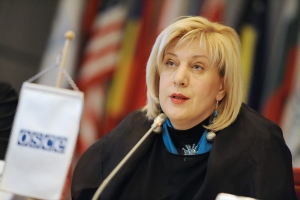OSCE media freedom representative calls on Turkish President to veto Internet Law, return it for public consultations
The OSCE Representative on Freedom of the Media, Dunja Mijatović, called on President of Turkey Abdullah Gül to veto the Internet Law and return it to Parliament and civil society for further discussions.

OSCE Representative on Freedom of the Media, Dunja Mijatović, delivering her regular report to the OSCE Permanent Council, Vienna, 28 November 2013.
“The new Internet Law will threaten free expression and media freedom in Turkey,” Mijatović wrote in a letter to President Gül. “It contains several highly worrisome provisions which could block free online discourse on issues of public interest.”
Mijatović pointed to a number of concerns with the law, including the increased authority of the communications regulator, the Telecommunications Communication Presidency (TIB), to request and collect data on any Internet user without judicial oversight; the power of TIB to instruct Internet service providers to retain traffic data without court decision, and hosting providers to retain communications data for up to two years; and new amendments that will allow for the possibility of blocking websites without sufficient court supervision.
“The Internet Law can lead to violations of privacy and Internet users’ rights as it allows for arbitrary interference by the regulator,” Mijatović said. “The law will lead to more restrictions on free speech and it can negatively affect journalists’ work.”
She noted that essential stakeholders were not consulted during the drafting process, and existing concerns about the restrictive nature of the original Internet Law were not considered.
“Your decision to veto the law in its current form would enable Parliament to consider its effect and allow for broad public discussions, including civil society, academia and other stakeholders,” Mijatović wrote to President Gül.
The Representative concluded by offering her assistance in bringing the new law in line with international standards on online freedom of expression.
Source: Organization for Security and Co-operation in Europe
- 418 reads
Human Rights
Ringing FOWPAL’s Peace Bell for the World:Nobel Peace Prize Laureates’ Visions and Actions

Protecting the World’s Cultural Diversity for a Sustainable Future

The Peace Bell Resonates at the 27th Eurasian Economic Summit

Declaration of World Day of the Power of Hope Endorsed by People in 158 Nations

Puppet Show I International Friendship Day 2020

